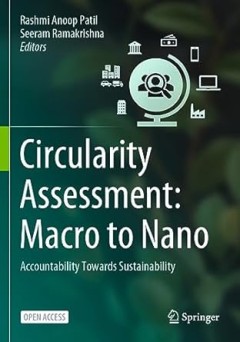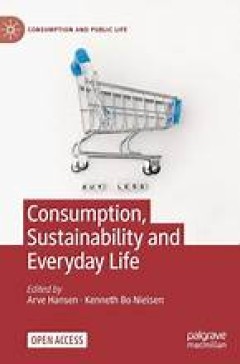Filter by

Circularity Assessment: Macro to Nano
This open access book attempts to provide a perspective on the circularity assessment at different levels of the systemic hierarchy and advocates better resource management for a sustainable future. It demonstrates how relevant circularity indicators are used for quantifying the extent of circularity of each level. Illustrative case studies that discuss the process of quantitatively interpretin…
- Edition
- 1
- ISBN/ISSN
- 978-981-19-9700-6
- Collation
- XXIX, 115
- Series Title
- -
- Call Number
- -

Green Recovery with Resilience and High Quality Development
- Edition
- 1
- ISBN/ISSN
- 978-981-19-9470-8
- Collation
- XXXIII, 625
- Series Title
- -
- Call Number
- -
- Edition
- 1
- ISBN/ISSN
- 978-981-19-9470-8
- Collation
- XXXIII, 625
- Series Title
- -
- Call Number
- -

Sustainable Land Use and Rural Development in Southeast Asia: Innovations and…
This book is based on the findings of a long-term (2000-2014) interdisciplinary research project of the University of Hohenheim in collaboration with several universities in Thailand and Vietnam. Titled Sustainable Land Use and Rural Development in Mountainous Areas in Southeast Asia, or the Uplands Program, the project aims to contribute through agricultural research to the conservation of nat…
- Edition
- -
- ISBN/ISSN
- 978-3-642-33377-4
- Collation
- X, 490
- Series Title
- Springer Environmental Science and Engineering (SPRINGERENVIRON)
- Call Number
- -

Tourism and Conservation-based Development in the Periphery : Lessons from Pa…
This open access book applies a social ecological systems (SES) lens to conservation-based development in Patagonia, bringing together authors with historical, contemporary, and future-oriented perspectives in order to increase understanding of the social and environmental implications of nature-based tourism and other forms of conservation-based territorial development. By focusing on Patagoni…
- Edition
- 1
- ISBN/ISSN
- 9783031380488
- Collation
- XXXIV, 468 hlm,: ill, lamp;
- Series Title
- -
- Call Number
- -

Energy Demand Challenges in Europe : Implications for policy, planning and pr…
This open access book examines the role of citizens in sustainable energy transitions across Europe. It explores energy problem framing, policy approaches and practical responses to the challenge of securing clean, affordable and sustainable energy for all citizens, focusing on households as the main unit of analysis. The book revolves around ten contributions that each summarise national trend…
- Edition
- 1
- ISBN/ISSN
- 9783030203399
- Collation
- XV, 157 hlm,: ill, lamp; 21 cm
- Series Title
- -
- Call Number
- -

Achieving the Paris Climate Agreement Goals : Global and Regional 100% Renewa…
This open access book presents detailed pathways to achieve 100% renewable energy by 2050, globally and across ten geographical regions. Based on state-of-the-art scenario modelling, it provides the vital missing link between renewable energy targets and the measures needed to achieve them. Bringing together the latest research in climate science, renewable energy technology, employment and res…
- Edition
- 1
- ISBN/ISSN
- 9783030058432
- Collation
- LIX, 491 hlm,: ill, lamp;
- Series Title
- -
- Call Number
- -

The European Landing Obligation: Reducing Discards in Complex, Multi-Species …
This open access book provides a comprehensive examination of the European Landing Obligation policy from many relevant perspectives. It includes evaluations of its impacts at economical, socio-cultural, ecological and institutional levels. It also discusses the feasibility and benefits of several potential mitigation strategies. The book was timely published, exactly at the time where the Land…
- Edition
- 1
- ISBN/ISSN
- 9783030033088
- Collation
- XIX, 431 hlm,: ill, lamp;
- Series Title
- -
- Call Number
- -

Assessment Framework for People-Centred Solutions to Carbon Neutrality : A Co…
This open access book presents a catalogue of over one thousand indicators which can be used by cities' public administrators to monitor and evaluate social innovation action plans to support people-centred, collaborative or co-designed solutions to lower carbon emissions. Indicators are clustered according to a framework of social innovation solutions for climate neutrality at city level, deve…
- Edition
- -
- ISBN/ISSN
- 978-3-031-53111-8
- Collation
- IX, 110
- Series Title
- SpringerBriefs in Applied Sciences and Technology (BRIEFSAPPLSCIENCES)
- Call Number
- 338 BRE a

Agroecological Transitions: From Theory to Practice in Local Participatory De…
This Open Access book presents feedback from the ‘Territorial Agroecological Transition in Action’- TATA-BOX research project, which was devoted to these specific issues. The multidisciplinary and multi-organisation research team steered a four-year action-research process in two territories of France. It also presents: i) the key dimensions to be considered when dealing with agroecologi…
- Edition
- 1
- ISBN/ISSN
- 9783030019532
- Collation
- XVI, 335 hlm; ill., lamp.,
- Series Title
- -
- Call Number
- -

Consumption, Sustainability and Everyday Life
This open access book seeks to understand why we consume as we do, how consumption changes, and why we keep consuming more and more, despite the visible damage we are doing to the planet. The chapters cover both the stubbornness of unsustainable consumption patterns in affluent societies and the drivers of rapidly increasing consumption in emerging economies. They focus on consumption patterns …
- Edition
- 1
- ISBN/ISSN
- 978-3-031-11069-6
- Collation
- oer.unej.ac.id
- Series Title
- Consumption and Public Life
- Call Number
- 306
 Computer Science, Information & General Works
Computer Science, Information & General Works  Philosophy & Psychology
Philosophy & Psychology  Religion
Religion  Social Sciences
Social Sciences  Language
Language  Pure Science
Pure Science  Applied Sciences
Applied Sciences  Art & Recreation
Art & Recreation  Literature
Literature  History & Geography
History & Geography